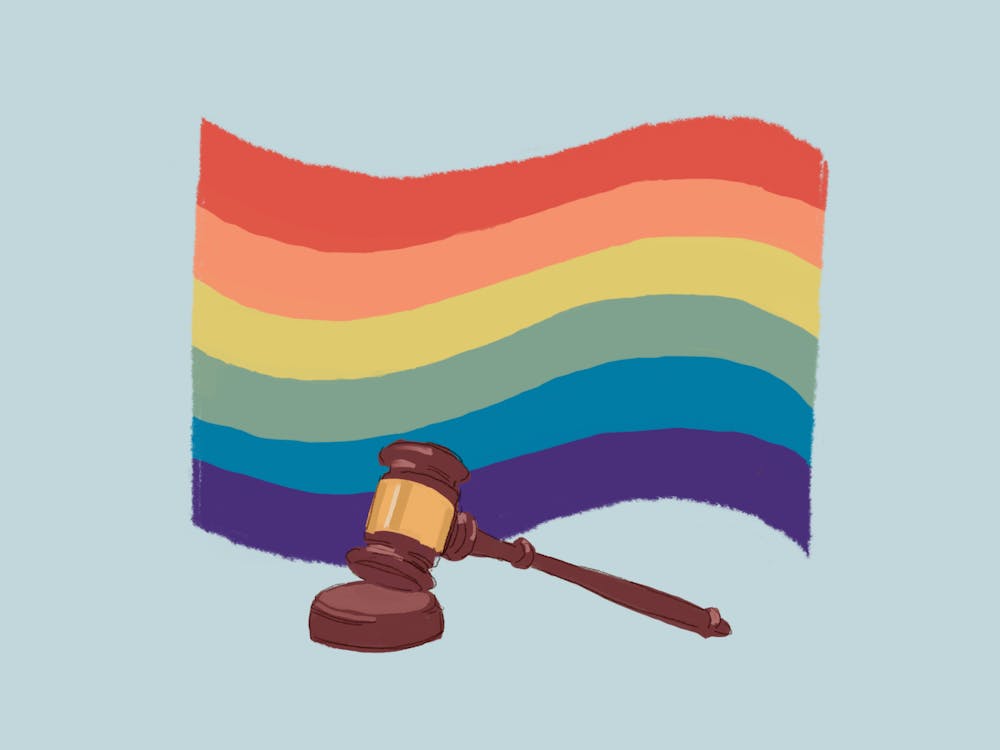In June of 2015, the United States Supreme Court ruled same–sex marriage legal in all fifty states.
In the case of Obergefell v. Hodges, Jim Obergefell and John Arthur were legally married while living in Maryland, but when they went to Ohio, were no longer legally allowed to be married. Eventually, the Supreme Court voted 5–4 in favor of Obergefell, stating that making same-sex marriage illegal was unconstitutional .
What this means is that even though same–sex marriage has culturally appeared as a nationally supported concept, it was a very recent adjustment in American law.
The call itself was relatively close, as four justices still opposed the ruling. Chief Justice John Roberts and Justices Antonin Scalia, Clarence Thomas, and Samuel Alito all wrote dissenting opinions to the case. In Justice Roberts' dissenting opinion, he argued that legalizing same–sex marriage could lead to legalization of polygamy, and that it was not supported by the Constitution. Justice Scalia commented that, “The stuff contained in today’s opinion has to diminish this Court’s reputation for clear thinking and sober analysis." Justice Alito argued the familiar point that marriage goes back to procreation and should remain between a man and a woman. Finally, Justice Thomas made an argument about liberty and how it meant freedom from government restriction implying that same–sex marriage being illegal did not restrain same–sex couples from living their lives as they wanted.
These dissenting details were, of course, not the pride of the case. By nationally legalizing same–sex marriage, the Court granted millions of couples respite and the security that their love could be officially documented in accordance with the Constitution.
This security, however, might be compromised.
The details of Obergefell v. Hodges are resurfacing due to a recent case which the Supreme Court declined to hear about a week ago. Kim Davis, a Christian clerk, was sent to jail when she refused to hand out marriage certificates to same–sex couples, although the Court refused to hear her case. Even so, Justices Thomas and Alito both commented that they thought that Davis was “one of the first victims of this Court’s cavalier treatment of religion.” Their argument is that the decision in Obergefell takes away religious liberty from citizens. Previously the justices have also mentioned needing to “fix” the issues created by the decision.
The latest confirmation of Amy Coney Barrett could be extremely problematic for marriage equality. Even though Barrett dismissed the possibility of overturning Obergefell, her past connections with religious groups and conservative political beliefs raise some red flags. She has claimed her views are "rooted in the Constitution" yet was appointed in part by Trump to largely push the Court to the right, following the death of the notably liberal Justice Ginsburg only one month prior.
Barrett could be the conservative ticket to reversing the Court's previous decision on same–sex marriage, a terrifying idea when considering how it has greatly changed the country for the past five years. I personally have taken marriage equality a bit for granted. When it was approved, I wasn’t really aware of LGBTQ+ issues. I was super excited for it, but I didn’t realize just how monumental the decision was.
While I wouldn’t completely panic and assume that marriage equality will get overturned if Barrett is appointed, I do think that this says a lot about our justice system. It shows just how outdated and possibly problematic it can be. The Supreme Court decides the law of the land—it has passed huge decisions on cases like Roe v. Wade, and Brown v. Board of Education. It has a ton of power in determining what laws we will follow, and harbors the ability to review the constitutionality of legislative actions.
At the same time, the justices are first nominated by the President of the United States, who will very clearly be on one party: either Democratic or Republican. That nomination then goes through the Senate for approval. Interestingly though, Supreme Court justices, unlike other positions in government, serve for the entirety of their lives, or until they decide to retire. The purpose of lifetime appointments is to ensure that justices are not swayed by popular opinion. Unlike people who have to be re–elected or re–appointed, justices would not have to worry about saying something that goes against popular opinion that would cause them to lose their appointment.
Still, having the same justices on the Supreme Court for decades is hardly conducive to progress. Our country is constantly changing with every new generation. Instead of getting new voices, we are forever stuck with the same old ones. In addition, since it’s only been a recent change that other voices have started to be represented in politics, the current Court bench does not seem to accurately represent all the voices of the citizens of America. It was only in Obama’s term that the first Hispanic and Latina member of the court, Justice Sotomayor was elected. On top of that, in the Court’s 230–year history, only four women have served on the Court.
With the expedient process to confirm Barrett into her position before the 2020 election occurred, it is clear there is a conservative agenda that is being pushed and pushed into the foreground. No major cases have occurred yet to threaten same–sex marriage, but rumors have begun to emerge of Democrats fighting to increase the amount of justices on the court to pull it further from the right. Regardless of what the future holds, one sentiment remains the same: the Court needs to change, not the decision on same–sex marriage.







